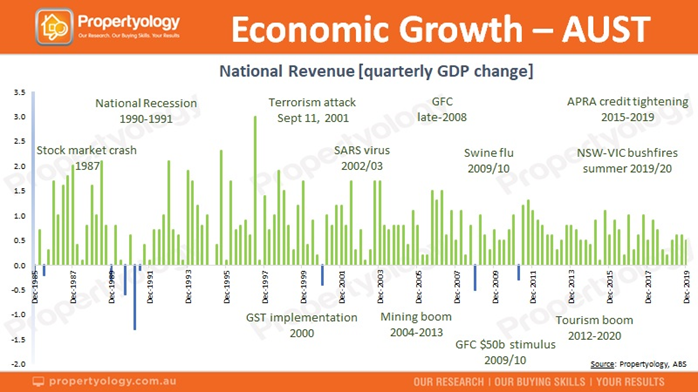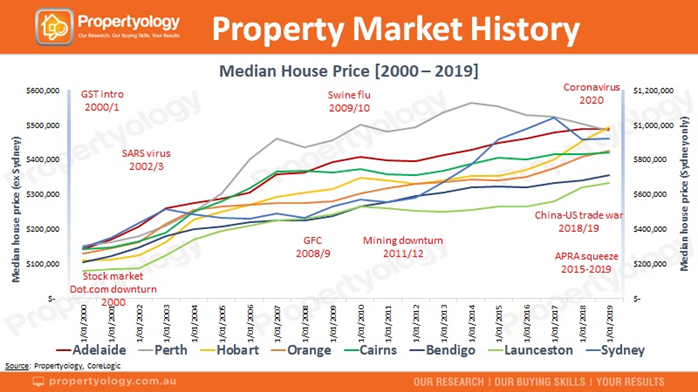Expert Advice with Simon Pressley
While digital media has many positives, for me, the biggest downside is that it amplifies negative news 50-fold.
The proliferation of negativity seems to have progressively diluted the human race’s mental ability to process stuff in a calm and logical manner.
Something comes from left-field, people then grab that piece of in-the-moment information and automatically jump to a worst-case-scenario outcome.
If you’re the glass-half-empty type, the coronavirus is your latest dose of doom and gloom to give yourself the excuse you’re looking for to put life on hold – yet again.
Excuses, excuses everywhere and not enough people pausing to think
From trade wars and natural disasters, when we faced the possibility of negative gearing being scrapped, to the various stock market wobbles over the years, the mining downturn, and election campaigns… there is always something happening somewhere that, according to some, could be the next Armageddon.
But the reality is that the direct impact that these events have had on property markets was nowhere near as damning as fear-mongering commentary suggested that it would be.
On the balance of probability, the coronavirus (a respiratory illness from the same family of viruses as the common cold and SARS) will have a miniscule influence on Australian property markets.
Propertyology sees no reason for adjustment to property market forecasts that were released only a month or so prior to January’s onset of the virus.
For total avoidance of any doubt, Propertyology maintains our initial stance that property market conditions right now are the best that they’ve been for more than a decade. The fundamentals have not changed!
To be frank, we are anticipating this will create a unique buying opportunity for our buyer’s agents. It’s a window in time that will be bookended by the solid start to 2020 – and when some nervous-Nelly’s return to the market once they’ve realised there was nothing to worry about.
In the words of Warren Buffet: ‘The time to be greedy is when everyone else is fearful’.
When the flock of seagulls come out and start fighting over that chip, they’ll drive property prices higher, making the biggest beneficiaries those who ate their chips before the flock arrived.

From a property market perspective, a virus is a one-off event which comes and goes within a relatively short period of time. Like SARS (2002-3) and swine flu (2009-10), we all have every reason to expect that this coronavirus risk will be largely gone within months, not years.
The fundamental purpose of real estate is the provision of shelter so individual properties do not change hands very often. For this reason, the property asset class, as opposed to shares on a stock exchange, does not experience wild fluctuations within short periods of time.
The impact of a virus on a property market is akin to a water stain on a ceiling within a house – we know that it must be taken seriously and that proper investigation will uncover a solution to the cause, but it has no bearing at all on the foundations of the asset. Deal with it and move on!
Propertyology analysis of calendar year property market performance of every single Australian town and city over the last twenty years confirms that, while there was an adverse impact on the broader national economy during the contagion, past global viruses have had no material impact on any property market.

The chart above contains the 20-year performance of a variety of locations from six different states, including a mix of capital cities and regional locations. Over two decades:
- Sydney’s median house price declined by a cumulative $64,000 between 2004 and 2006 and by $192,000 in 2017-19 – on both occasions the decline followed their property boom and was primarily due to too much new supply; SARS and swine flu left no scars.
- Perth produced declines of $50,000 in 2007-08 and $80,000 spread over the last 5-years, both were caused by local economic conditions.
- The NSW regional city of Orange’s only decline over the last 20-years was a miserly $1,500 in 2015 (Electrolux, their biggest employer, announced its factory closure).
- While the world was dealing with SARS (2002-03) and swine flu (2009-10), Bendigo’s median house price increased by 20 percent and 10 percent, respectively, in those years. The central Victorian regional city produced only the one calendar year of median house price decline during the last 20-years, which was $2,250 (or -0.7 percent) in 2016 – and it had absolutely nothing to do with a virus.
- Adelaide (-$10,700 in 2011), Cairns (-$17,000 in 2011-12) and most of Australia performed poorly in 2011-12 after the GFC-stimulus unwind.
- Hobart (-$18,000 2011-12) and Launceston (-$16,350 2011-13) had a combination of the GFC-stimulus unwind plus its state economy was in recession back then.
Anyone who wants to make wild claims that the coronavirus will cause property prices to retreat is doing so with zero precedent to substantiate such a statement - but doomsayers do love their Armageddon theories, don’t they?
Apparently, within a country of 25.6 million people, there were more than 300,000 confirmed cases of influenza in Australia in 2019 and approximately 4,000 deaths last year from the flu and related illnesses such as pneumonia.
Since the global declaration of the outbreak on 30 January to 6 March 2020, there were 59 confirmed cases of coronavirus in Australia, 22 had already fully recovered, and two (elderly) people had died [refer here for the latest update].
As with other viruses, the collective clever minds of scientists and medical experts world-wide will defeat this thing. Like the flu, some of us will catch the coronavirus and the majority of those who do will recover within a couple of weeks. Like the flu, we should all take responsible and reasonable precautions to minimise transmission of the virus.
It would so far seem that we’ll see and read (probably daily) stories in the media of contamination reports causing temporary closures of schools, businesses and other venues. I can only hope that my friends in the media show some strong leadership here by responsibly keeping everything in proper perspective. There are lots of good news stories we’d rather see fill our newsfeeds.
This is far from Armageddon, but it won’t take much for those with simple minds to believe otherwise. Picking a fight over toilet paper with a stranger inside a supermarket is Exhibit A.
While the preventative response by governments and various other stakeholders will adversely affect the national economy, the disruption is likely to be over within months. A non-recurring item that directly causes a lean few months and a red number on the yearly profit-and-loss statement does not make it a troubled business.
Well-established, sustainable businesses adjust to one-off events, they draw on financial reserves as required, and they get on with it. In time, they look back on the financial results of that isolated situation as a small moment in time.
We should all expect the same here with Australia’s finances. The federal and state governments have already started releasing some financial support packages and there’ll be some significant economic stimulus packages to come shortly.
Let’s not forget that Australia’s financial strength got us through the Global Financial Crisis – the biggest economic downturn in the history of mankind. This coronavirus pales into insignificance compared with GFC.
Safe as houses
Stock markets typically react to sentiment as again evidenced by the ASX 200 index shedding eight percent in value during the month of February. History has proven that some share investors respond to perceived uncertainty from major global events by withdrawing their equities and placing their money in safer alternatives. Real estate has always been a very popular alternative but, with cash rates being so low, it might look even more attractive right now.
Residential property rental yields (income) of circa five percent against home loan rates (expenses) of three percent is something that this country has never seen before.
While I agree that the global quarantine efforts to contain the coronavirus has the potential to have a significant impact on the national economy, I anticipate that the federal budget (as opposed to the local economy of every town and city) will wear the biggest brunt. And it will be short-term.
Last week, the Federal Treasury forecast that this summer’s bushfires will have a 0.2 percent drag on 2020 Q1 GDP results and that the coronavirus would have an additional 0.5 percent impact. Further impact in Q2 2020 is possible.
It’s anyone’s guess, but I wouldn’t be surprised if Australia doesn’t quite manage to avoid two consecutive quarters of negative economic growth. With the knowledge that the cause is isolated to non-recurring events (as opposed to weak fundamentals) a technical recession would not be catastrophic if it happened.
Again, for the glass-half-empty folk, a year or two of soft national economic results doesn’t mean that property markets all over the nation are performing poorly [refer Australian property markets during the last recession].
While the property market performance of each individual town and city is influenced in some way by macro factors such as national economic conditions, the defining factors are always local housing supply, local confidence, local housing affordability, and local economic conditions.
Need I remind people that current macro fundamentals include all-time record low interest rates, first home buyer incentives, improved credit supply, population growing by 400,000 per year, falling volumes of housing construction (new supply), low (and in most cases declining) vacancy rates, and (in many cases) rising rents.
Australia’s prudent economic management in recent years means that we are, today, in a very strong position to do what’s required to swiftly manage the coronavirus economic repercussions and move on.
The short-term (albeit potentially significant) reduction in the supply of some goods and services due to global quarantine measures will be offset as best we can with a series of targeted stimulus packages, additional fast-tracking of infrastructure projects, and some cuts somewhere else in the Federal Budget.
Other countries, including China, are also highly likely to introduce stimulus. So, all of the pent-up demand created during these quarantine months will probably be followed by a big surge.
As I said, ‘seagulls and chips’!
Be responsible, but get on with it
While the coronavirus obviously is a serious thing, so is the flu, cancer, road safety and a bunch of other very important health-related topics. Everyone making a conscious effort to remain calm and keep the coronavirus in perspective is very important for the nation to prevent unintended consequences – that is, the short-term economic retraction becoming any bigger than it needs to.
It’s my personal view that the current volume of coverage is well out of proportion. I fail to see how hour-by-hour reporting of the latest person to become infected is any more helpful than creating a ‘news story’ out of someone contracting the flu.
While it’s easy for us all to laugh at bulk buying of toilet paper and bags of rice, this is an important early reminder of how easy it is to cause public panic. The single biggest risk to all Australians is en masse panic, which causes people to huddle in cocoons. That would be dumb!
Not-so-nice stuff arrives in different packaging every single year, but life goes on. We can all help each other with some simple lead-by-example words of affirmation and by going about our daily lives as normal.
Life’s good, yeah! I don’t know about everyone else, but I do know that there’s an important purpose for my daily job, my son is growing up fast, I’m looking forward to date-night with my beautiful wife at a nice restaurant this weekend, footy season is back, our next holiday is planned, another financial milestone for our future will be achieved during 2020… no coronavirus is going to get in the way of that for me and I encourage everyone else to have the same attitude.
Being more vigilant with one’s hygiene is not rocket science. To avoid transmission to others, it’s always been the responsible thing to keep the kids home from school or to work from home if someone in the household has caught a virus. There’s no need to be any more dramatic about coronavirus than the flu.
Come on people, we got this!
......................................................................
 Simon Pressley is Head of Property Market Research and Managing Director at Propertyology.
Simon Pressley is Head of Property Market Research and Managing Director at Propertyology.
Propertyology is a national property market researcher and buyer’s agency, helping everyday people to invest in strategically-chosen locations all over Australia. The multi-award-winning firm’s success includes being a finalist in the 2017 Telstra Business Awards and 2018 winner of Buyer’s Agency of the Year in REIQ Awards For Excellence.
Disclaimer: while due care is taken, the viewpoints expressed by contributors do not necessarily reflect the opinions of Your Investment Property.